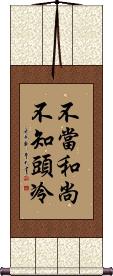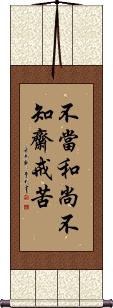Many custom options...
And formats...

Not what you want?
Try other similar-meaning words, fewer words, or just one word.
Feel free to email me with your request. If it's easy, I'll translate it for free and add it to this database of calligraphy for you.
To Know Hardship One Must Experience It in Chinese / Japanese...
Buy a To Know Hardship One Must Experience It calligraphy wall scroll here!
Personalize your custom “To Know Hardship One Must Experience It” project by clicking the button next to your favorite “To Know Hardship One Must Experience It” title below...
To Know Hardship, One Must Experience It
不當和尚不知頭冷 is a Chinese proverb that literally translates as: [One who has] not been a monk [does] not know [the feeling of a] cold head.
I need to explain that a Chinese Buddhist monk always has a shaved head, and thus a cold head in winter.
Figuratively, this means: One cannot know the true meaning of hardship until one has experienced it oneself.
This is an idiom in Chinese, so the figurative meaning is what people perceive when they hear or read this phrase. Just as in English, when someone says, "The grass is always greener," one will think about the idea of jealousy, rather than the quality of one’s lawn.
If you have not been a monk, how can you know what it is like to be a vegetarian?
Only by experiencing hardship will allow you understand the plight of others
不當和尚不知齋戒苦 literally translates as:
[One who has] not been a monk [does not] know the suffering of [being on a] vegetarian diet.
This is a bit like the “walk a mile in another man's shoes” saying. Basically, it's about you cannot fully understand the plight of others until you experience it yourself.
Not the results for to know hardship one must experience it that you were looking for?
Below are some entries from our dictionary that may match your to know hardship one must experience it search...
| Characters If shown, 2nd row is Simp. Chinese |
Pronunciation Romanization |
Simple Dictionary Definition |
受苦 see styles |
shòu kǔ shou4 ku3 shou k`u shou ku juku じゅく |
to suffer hardship suffering pain; experiencing hardship feel [experience, undergo] suffering |
憂目 see styles |
ukime うきめ |
(irregular okurigana usage) bitter experience; misery; distress; grief; sad thoughts; hardship |
うき目 see styles |
ukime うきめ |
bitter experience; misery; distress; grief; sad thoughts; hardship |
嘗める see styles |
nameru なめる |
(transitive verb) (1) to lick; (2) to taste; (3) to experience (esp. a hardship); (4) to make fun of; to make light of; to put down; to treat with contempt; to underestimate |
憂き目 see styles |
ukime うきめ |
bitter experience; misery; distress; grief; sad thoughts; hardship |
甞める see styles |
nameru なめる |
(transitive verb) (1) to lick; (2) to taste; (3) to experience (esp. a hardship); (4) to make fun of; to make light of; to put down; to treat with contempt; to underestimate |
舐める see styles |
nameru なめる |
(transitive verb) (1) to lick; (2) to taste; (3) to experience (esp. a hardship); (4) to make fun of; to make light of; to put down; to treat with contempt; to underestimate |
Variations: |
shiru しる |
(transitive verb) (1) to know; to be aware (of); to be conscious (of); to learn (of); to find out; to discover; (transitive verb) (2) to sense; to feel; to notice; to realize; (transitive verb) (3) to understand; to comprehend; to grasp; to appreciate; (transitive verb) (4) to remember; to be familiar with; to be acquainted with; (transitive verb) (5) to experience; to go through; to know (e.g. hardship); (transitive verb) (6) to get acquainted with (a person); to get to know; (transitive verb) (7) (usu. with neg. sentence) to have to do with; to be concerned with; to be one's concern; to be one's responsibility |
Variations: |
nameru なめる |
(transitive verb) (1) to lick; to lap; to suck; (transitive verb) (2) to taste; (transitive verb) (3) to experience (esp. a hardship); (transitive verb) (4) (kana only) (poss. from 無礼(なめ); also written 無礼る) (See 無礼・なめ) to look down on (someone); to make fun of; to put down; to treat with contempt; to underestimate; (transitive verb) (5) to lick (at; of flames); to burn |
Variations: |
nakiomiru なきをみる |
(exp,v1) (idiom) to experience hardship; to suffer a bad experience; to be put in a tough spot |
Variations: |
ukime うきめ |
bitter experience; misery; distress; grief; sad thoughts; hardship |
Variations: |
nameru なめる |
(transitive verb) (1) to lick; to lap; to suck; (transitive verb) (2) to taste; (transitive verb) (3) to experience (esp. a hardship); (transitive verb) (4) (kana only) (poss. from 無礼(なめ); also written 無礼る) (See 無礼・なめ) to look down on (someone); to make fun of; to put down; to treat with contempt; to underestimate; (transitive verb) (5) to lick (at; of flames); to burn |
Variations: |
nameru(p); nameru(sk) なめる(P); ナメる(sk) |
(transitive verb) (1) to lick; to lap; to suck; (transitive verb) (2) to taste; (transitive verb) (3) to experience (esp. a hardship); (transitive verb) (4) (kana only) (also written as ナメる and 無礼る) to underestimate; to make light of; to look down on (someone); to make a fool of; to treat with contempt; to disparage; (transitive verb) (5) to lick (at; of flames); to burn |
The following table may be helpful for those studying Chinese or Japanese...
| Title | Characters | Romaji (Romanized Japanese) | Various forms of Romanized Chinese | |
| To Know Hardship, One Must Experience It | 不當和尚不知頭冷 不当和尚不知头冷 | bù dāng hé shàng bù zhī tóu lěng bu4 dang1 he2 shang4 bu4 zhi1 tou2 leng3 bu dang he shang bu zhi tou leng | pu tang ho shang pu chih t`ou leng pu tang ho shang pu chih tou leng |
|
| If you have not been a monk, how can you know what it is like to be a vegetarian? | 不當和尚不知齋戒苦 不当和尚不知斋戒苦 | bù dāng hé shang bù zhī zhāi jiè kǔ bu4 dang1 he2 shang bu4 zhi1 zhai1 jie4 ku3 bu dang he shang bu zhi zhai jie ku | pu tang ho shang pu chih chai chieh k`u pu tang ho shang pu chih chai chieh ku |
|
| In some entries above you will see that characters have different versions above and below a line. In these cases, the characters above the line are Traditional Chinese, while the ones below are Simplified Chinese. | ||||
Successful Chinese Character and Japanese Kanji calligraphy searches within the last few hours...





